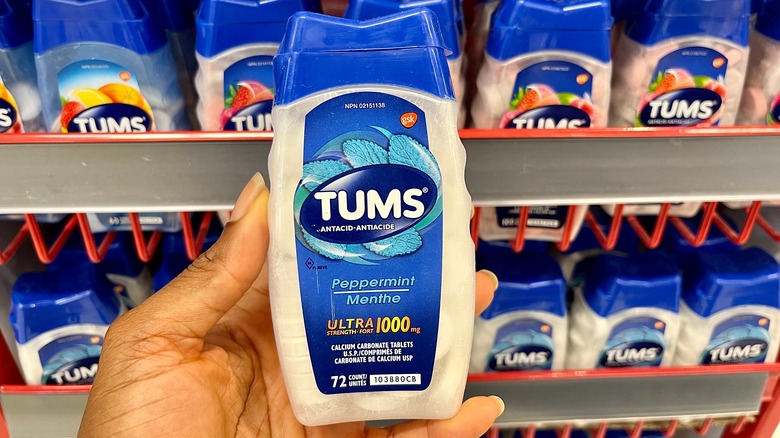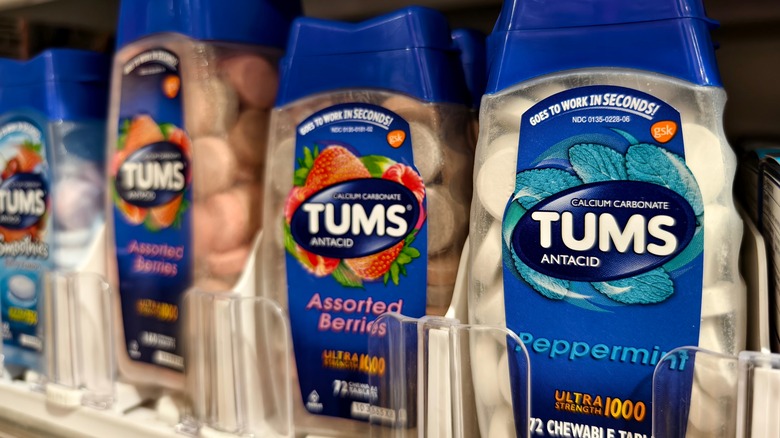When You Take Tums Every Day, This Is What Happens To Your Kidney Stone Risk
Most of us are familiar with the rumbling and grumbling that occasionally emerges from our belly after indulging in a big meal, eating too quickly, or consuming something that doesn't quite agree with us. Tums and other antacid medications can help relieve this unpleasant sensation, otherwise known as indigestion, along with the discomfort of heartburn and an upset stomach (per Tums). No prescription is needed for over-the-counter (OTC) antacid brands, Tums included, making them readily accessible.
Once ingested, it doesn't take long for Tums to start working. The medicine contains the active ingredient calcium carbonate, which acts quickly to neutralize esophageal and stomach acid to relieve symptoms. This includes signs of heartburn, such as burning chest pain, pain that intensifies when lying down, or an acid-like taste in the mouth.
Tums products come in different forms, including chews, tablets, and smoothies. Depending on which product you use, dose recommendations will vary. It's important to stick to the labeled instructions, which advise against using the medication for more than two weeks.
What does this have to do with kidney stones? Experts at Mount Sinai explain that long-term use of antacids containing calcium can mess with the makeup of our urine, increasing our risk for this health condition.
How Tums increases the risk of kidney stones
Over time, calcium-containing antacids can alter the acid concentration of our pee, explains Mount Sinai. Greater amounts of calcium are then eliminated from the body through urination, which can make a person more prone to kidney stones (per Prevention). Out of four different types of kidney stones, calcium stones make up approximately 80% of kidney stone cases, with calcium oxalate stones being the most common, reports the Urology Care Foundation. The crystallized minerals that form when too much calcium has accumulated in our urine may lead to pain in the back or side that migrates to the pelvic region, burning sensations when peeing, an urgent need to urinate, and blood in the urine.
Too much calcium carbonate in our system also poses the risk of hypercalcemia, also referred to as milk-alkali syndrome, in which the lining of the stomach or duodenum begins to break down, reports Prevention. "Milk-alkali syndrome can lead to kidney failure and deposition of calcium throughout organs, especially in the kidney," Dr. Robert Glatter, attending emergency physician at Lenox Hill Hospital, told the publication. Should calcium make its way to other parts of the body, this can lead to organ failure in more severe instances.
How to take Tums safely to protect your kidney health
Just like with prescription drugs, we want to use antacids safely. Milk-alkali syndrome can be resolved with cessation of the medication and kidney stone risk can be reduced by not taking too many Tums too often (via Prevention). The company outlines how the medicine comes in 500-, 750-, and 1,000-milligram doses and is intended only for people 12 years and older (per Tums). Talk to your doctor before taking antacids to determine how much is safe for consumption, particularly if you have any underlying health conditions or take any additional medications. People with kidney disease are advised to avoid antacids altogether.
Remember, Tums and other antacids are intended for short-term use. If you find that you're reaching for a bottle of Tums on a regular basis, consult with your healthcare provider as it could indicate something else going on. Tums should not be used for the treatment of diarrhea, constipation, or bloating. MedlinePlus reports that the medication is also not intended for the treatment of gallstones (which are not the same as kidney stones), stomach ulcers, appendicitis, and other serious gastrointestinal problems. For more information, here's an in-depth list of what you can do to decrease your risk of kidney stones.


